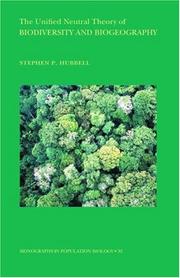| Listing 1 - 2 of 2 |
Sort by
|
Book
ISBN: 0198868561 9780198868569 019886857X 9780198868576 Year: 2023 Publisher: Oxford : Oxford university press,
Abstract | Keywords | Export | Availability | Bookmark
 Loading...
Loading...Choose an application
- Reference Manager
- EndNote
- RefWorks (Direct export to RefWorks)
"Island biogeography: geo-environmental dynamics, ecology, evolution, human impact, and conservation provides a synthetic review covering islands as model systems in the life sciences. It is centred on the study of the geographical distribution of biodiversity and how it changes through time, understood through the medium of island biotas and ecosystems. It comprises four parts devoted in turn to: island environments; ecology; evolution; and human impact and conservation. It describes the origins and dynamics of different island types and the key characteristics of island environments that shape their biotic characteristics. It identifies key theories of island ecology and reviews progress towards their evaluation and development. It sets out the essential building blocks of island evolution and the emergent patterns of insular endemism and of island evolutionary syndromes in animals and plants. It reviews how island geo-environmental dynamics are of crucial relevance to understanding and developing improved explanatory and predictive models of their ecological and evolutionary dynamics. It reviews the application of island theory to fragmented ecosystems. It describes the spread of human societies across the islands of the world and the impact of these and subsequent human colonization events on the environments, biotas, and sustainability of societies on islands. It reviews evidence of anthropogenic extinction on islands, identifying key extinction drivers and threats to existing native species and ecosystems, and ways in which island evolution may make island species particularly vulnerable to certain external influences. It considers the distinctive conservation challenges and solutions that may be effective on islands."--
Biogeography. --- Evolution (Biology). --- Island ecology. --- Basic Sciences. Biology -- Biogeography.

ISBN: 0691021287 9780691021287 9780691021294 0691021295 128313473X 1400837529 9786613134738 9781400837526 Year: 2011 Volume: 32 Publisher: Princeton, NJ
Abstract | Keywords | Export | Availability | Bookmark
 Loading...
Loading...Choose an application
- Reference Manager
- EndNote
- RefWorks (Direct export to RefWorks)
Despite its supreme importance and the threat of its global crash, biodiversity remains poorly understood both empirically and theoretically. This ambitious book presents a new, general neutral theory to explain the origin, maintenance, and loss of biodiversity in a biogeographic context. Until now biogeography (the study of the geographic distribution of species) and biodiversity (the study of species richness and relative species abundance) have had largely disjunct intellectual histories. In this book, Stephen Hubbell develops a formal mathematical theory that unifies these two fields. When a speciation process is incorporated into Robert H. MacArthur and Edward O. Wilson's now classical theory of island biogeography, the generalized theory predicts the existence of a universal, dimensionless biodiversity number. In the theory, this fundamental biodiversity number, together with the migration or dispersal rate, completely determines the steady-state distribution of species richness and relative species abundance on local to large geographic spatial scales and short-term to evolutionary time scales. Although neutral, Hubbell's theory is nevertheless able to generate many nonobvious, testable, and remarkably accurate quantitative predictions about biodiversity and biogeography. In many ways Hubbell's theory is the ecological analog to the neutral theory of genetic drift in genetics. The unified neutral theory of biogeography and biodiversity should stimulate research in new theoretical and empirical directions by ecologists, evolutionary biologists, and biogeographers.
Biomathematics. Biometry. Biostatistics --- Biogeography --- General ecology and biosociology --- Biodiversity --- Biodiversité --- Biogéographie --- 574.9 --- 574.472 --- Biological diversity --- Areography (Biology) --- Geographical distribution of animals and plants --- Species --- Species distribution --- Biology --- Geography --- Biological diversification --- Biotic diversity --- Diversification, Biological --- Diversity, Biological --- Biocomplexity --- Ecological heterogeneity --- Numbers of species --- Biogeography in general. Geographical distribution of organisms --- Geographical distribution --- Biodiversity. --- Biogeography. --- 574.472 Biodiversity --- 574.9 Biogeography in general. Geographical distribution of organisms --- Biodiversité --- Biogéographie --- Environmental Sciences and Forestry. Nature Management -- Biodiversity. --- Basic Sciences. Biology -- Biogeography.
| Listing 1 - 2 of 2 |
Sort by
|

 Search
Search Feedback
Feedback About UniCat
About UniCat  Help
Help News
News